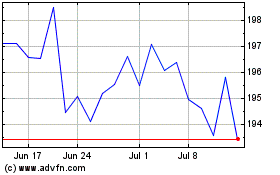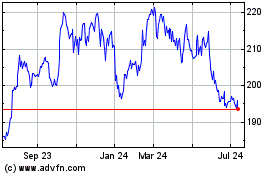SEC Considering Access-Fee Cap For Some Options Exchanges
April 14 2010 - 10:40AM
Dow Jones News
The Securities and Exchange Commission on Wednesday said it will
consider proposing new rules to cap trading fees for customers of
some options exchanges.
The proposal seeks to more closely align the actual cost of
executing an options trade with the additional costs of accessing
quotes on exchanges and the wide range of fees charged by different
markets, according agency documents.
"In practice, the displayed quotation on an options exchange may
not reflect the actual amount a person will pay to buy or sell the
option," SEC staff wrote in a statement.
"Instead, the person often incurs additional costs to conduct
the transaction, including the cost of accessing the exchange's
quotation."
The proposal addresses a long-simmering debate in the options
industry over whether or not exchange fees should be assessed in a
way that is similar to the U.S. stock market.
New rules would target options markets running a so-called
maker-taker pricing model, in which market makers receive rebate
payments from the exchange to provide liquidity to the market, and
customers are charged fees for trades that remove liquidity.
Those fees, according to the SEC, aren't part of the displayed
quote, and can make it harder for investors to figure the exact
cost of doing business.
The potential rule would cap such access fees at 30 cents per
contract, and extend rules prohibiting exchanges from imposing
"unfairly discriminatory terms" to cover options trading.
Maker-taker pricing has been around for years, but has picked up
steam recently.
NYSE Euronext's Arca platform is the largest U.S. options
exchange by volume that runs a pure make-or-take model, but January
saw Nasdaq OMX Group Inc. (NDAQ) roll out such pricing at its PHLX
platform, and the International Securities Exchange has introduced
its own version as well.
Smaller exchanges, including the Nasdaq Options Market and BATS
Options, also run full maker-taker venues.
Separately, the SEC also said it is considering a proposal that
would require firms engaged in high-frequency trading to carry
unique identifiers, enabling regulators to more closely track their
activities in U.S. markets.
-By Jacob Bunge, Dow Jones Newswires; (312) 750 4117;
jacob.bunge@dowjones.com
CME (NASDAQ:CME)
Historical Stock Chart
From Jun 2024 to Jul 2024

CME (NASDAQ:CME)
Historical Stock Chart
From Jul 2023 to Jul 2024
